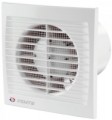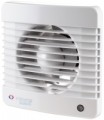Air flow (extraction)
This parameter describes the amount of air that the fan can pass through itself per hour when operating in extraction mode (see "Type"). It is one of the key characteristics of any extractor fan — it characterizes the overall performance and suitability of the unit for a particular room.
When choosing a fan for
maximum performance, two main indicators must be taken into account — the volume of the room and the air flow rate. The volume can be found by multiplying the area of the room by the height of the ceilings: for example, for a room of 12 m² in a residential apartment with standard ceilings of 2.5 m, this figure will be 12x2.5=30 m³. The air flow rate describes how many times per hour the air in an enclosed space must be completely replaced for ventilation to be sufficiently effective. This multiplicity is different for different types of premises: in particular, for the kitchen, it is 6-8, for the bathroom — 8-10, etc. More detailed values be found in specialized sources, in particular, sanitary standards. And the minimum required fan performance is calculated by multiplying the air volume by the air exchange rate. For example, if we have a bathroom with an area of 4 m² with the same ceiling of 2.5 m, then the volume of air in it will be 4x2=10 m³; Considering that the minimum air exchange rate for bathrooms is 7, for this room we need a fan with a capacity of at least 70 m³/h.
Cover height
The size of the decorative fan cover in height.
For details on the features of such panels in different types of fans, see "Cover diameter". The same size is indicated in cases where the panels are in the shape of a square or rectangle (see "Cover shape").
Cover width
The size of the decorative fan cover in width.
For details on the features of such panels in different types of fans, see "Cover diameter". The same size is indicated in cases where the panels are in the shape of a square or rectangle (see "Cover shape").
Cover thickness
The size of the decorative fan cover in thickness.
This parameter describes how much such a panel protrudes above the surface of the wall or ceiling on which the fan is installed. For more information about the general features of decorative panels in different types of fans, see "Cover diameter".
Mounting depth (duct)
Mounting depth of the fan with a standard installation method.
This parameter describes how deep into the duct the unit (or its parts in the case of surface-mounted models, see "Type") is placed during installation. Knowing the mounting depth, it is possible to assess the suitability of the selected model for a particular installation location: a flat section at the very beginning of the duct must be no less than the installation depth of the selected fan.
The smallest value of this parameter is typical for some overhead models of fans: in them, the main part of the structure is outside, and usually, only 2-3 centimetres are required for installation. And most of all, hidden units require space (see "Type").

